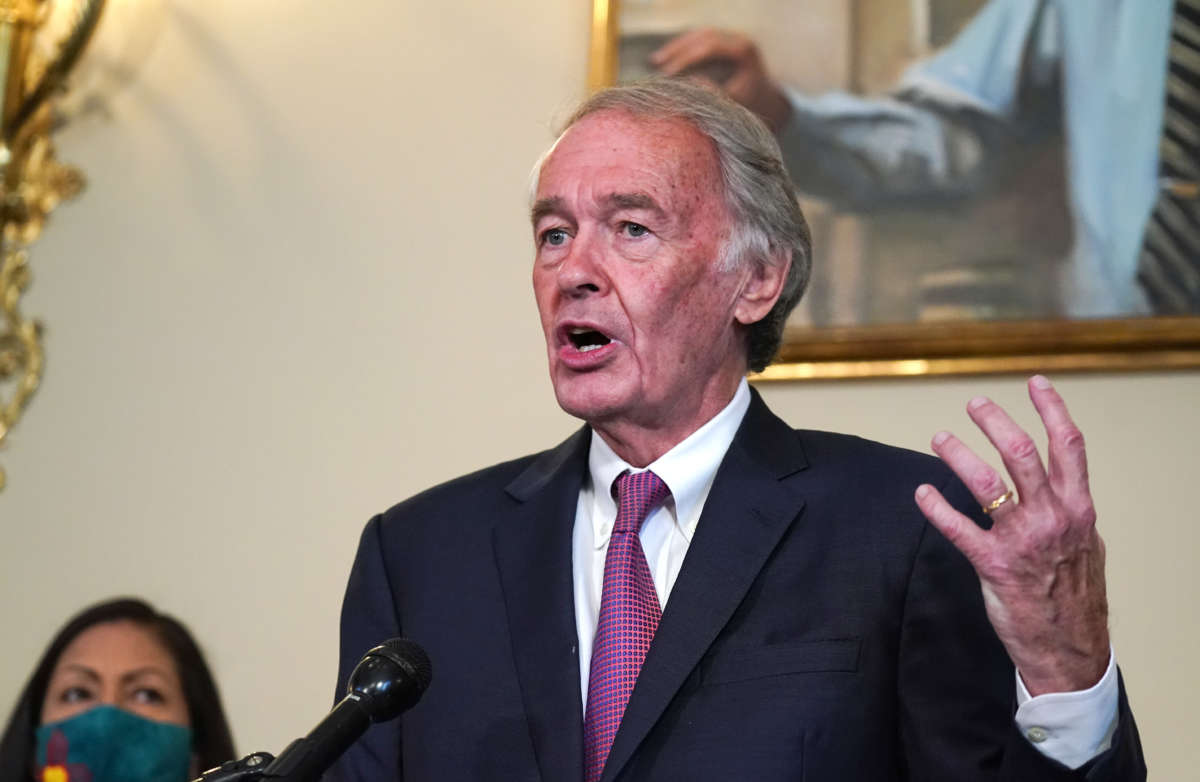Support justice-driven, accurate and transparent news — make a quick donation to Truthout today!
Congressional progressives on Monday unveiled a new bill to invest $10 trillion in renewable energy, green infrastructure and climate justice initiatives over the next decade. The Transform, Heal and Renew by Investing in a Vibrant Economy (THRIVE) Act, counters President Joe Biden’s yet-to-be-unveiled $4 trillion infrastructure package.
The bill is “a new roadmap to build back better and build back greener,” said Sen. Ed Markey (D-Massachusetts) in a press conference. Markey and Rep. Debbie Dingell (D-Mich.) are the lead sponsors of the bill in the Senate and House, respectively. The bill, which will be formally introduced in April, has the support of much of the rest of the Congressional Progressive Caucus.
“We are facing a series of intersecting crises: climate change, a public health pandemic, racial injustice and economic inequality,” said Markey. “We can’t defeat any of these crises alone. We must develop a roadmap for recovery that addresses them all.”
One of the bill’s main goals is to cut emissions. It aims to cut climate pollution in half by 2030 and establishes goals to achieve zero emissions from both new buildings by 2025 and the electricity sector by 2035. It would also extend public transportation options to most Americans by 2030, and states that the funding cannot be used for fossil fuels, emissions offsets or geoengineering.
“Our nation has rarely been challenged like it’s been in the past year,” said Dingell in the press conference. “Though we’re beginning to see brighter days on the horizon, we aren’t nearly out of the woods yet.” Dingell said that “the moment is now” to act boldly on climate and justice and points out that policies like Social Security were born in times of national crises.
The new bill directs that half of the climate investments in the bill are directed at frontline communities, which suffer the brunt of the climate crisis and economic crises facing the country. It aims to even out generations of racial and economic health inequities and includes provisions like upgrading and replacing corroded water infrastructure. Frontline communities are less likely in the U.S. to have access to clean water.
An analysis by the Sierra Club found that the THRIVE Act could create 15 million jobs while cutting pollution. The Sierra Club is part of the Green New Deal Network, a coalition of 15 environmental, progressive and labor groups coalescing around the THRIVE Agenda who helped shape the bill.
The THRIVE Agenda, a nonbinding resolution which was introduced by Interior Secretary Deb Haaland when she was a New Mexico representative, outlines commitments to labor rights, robust climate policy, and addressing socioeconomic and racial injustices. According to polls by Data for Progress, the agenda’s pillars are popular among the public.
“We need a plan that will end the unemployment crisis, but we need this plan to also fight systemic racism, protect public health and drastically cut down on climate pollution,” said Markey on Monday. “We cannot go back to business as usual. We have a chance to truly, in this moment, to build back better and greener than ever before.”
Those involved with the agenda and bill told Kate Aronoff of The New Republic that they view it as a “down payment” on the Green New Deal — a way to lift the country out of the pandemic and propel it forward from where it was before on many fronts. But THRIVE is generally built to capture a wider swath of Democrats; Dingell, for instance, didn’t co-sponsor the Green New Deal resolution when it was introduced by Rep. Alexandria Ocasio-Cortez (D-New York) in 2019.
Though the bill isn’t yet fully fleshed out, it could include provisions that Democrats have introduced over the past months, such as BUILD GREEN Act’s $500 billion investment over the next decade to help electrify public transit, or a $454 billion proposal to create a more robust electric car manufacturing chain in the U.S. The bill itself endorses the Protecting the Right to Organize Act that the House passed earlier this month.
The bill rivals Biden’s upcoming infrastructure bill and places progressive pressure on the White House from the left. The infrastructure bill, which is reported to have ballooned from $3 trillion to $4 trillion in the past week, has received criticism from the left. Groups like the Sunrise Movement, which has proposed its own $10 trillion Green New Deal down payment, say that the bill is not ambitious enough to meet the scale of the crises in the country.
Media that fights fascism
Truthout is funded almost entirely by readers — that’s why we can speak truth to power and cut against the mainstream narrative. But independent journalists at Truthout face mounting political repression under Trump.
We rely on your support to survive McCarthyist censorship. Please make a tax-deductible one-time or monthly donation.
